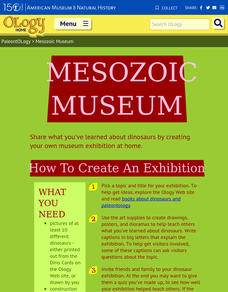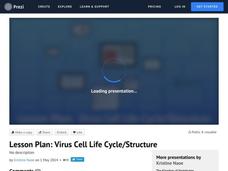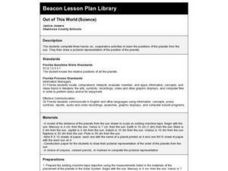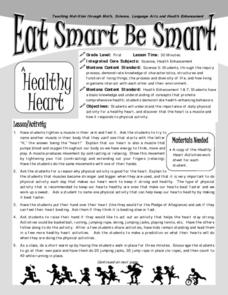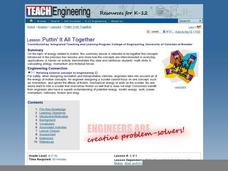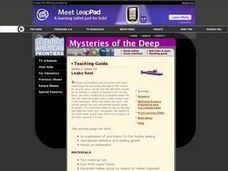Pulitzer Center
Extractive Industries
Here is a chance for environmental studies classes to take a critical look at crises occurring around the globe by reading articles and viewing video clips. The human activities under scrutiny are the extraction of oil, logging, and...
NOAA
Make Your Own Volcano!
Make a volcano erupt in your own classroom! Young scientists use household and craft materials to model and simulate the eruption of a volcano.
American Museum of Natural History
Buried Bones
Patience is the name of the game. Using Plaster of Paris and chicken bones, learners simulate an archeological dig site. They excavate the chicken bones over a period of several days using tools and a large amount of patience.
Purdue University
Global Design for the Seasons
People don't all get the same amount of sun at the same time of the year. Collaborative groups explore how the motion of Earth contributes to the idea in an inquiry-based STEM lesson. Learners first investigate how the rotation of Earth...
American Museum of Natural History
Mesozoic Museum
Mini museum curators create an exhibit that showcases the Mesozoic era. Pupils use their knowledge of dinosaurs to make informative posters, drawings, and dioramas. Following three steps to complete the hands-on activity, scholars read...
Prezi
Virus Cell Life Cycle/Structure
Viruses were nano before it was cool to be nano. The presentation covers the structure of a virus cell and the life cycle of a virus. It also includes two videos illustrating the virus cell in greater detail.
Serendip
Diffusion and Cell Size and Shape
Is your class ready to size up the topic of diffusion? Help them get cell shape savvy with a well-written handout. The resource covers how substances such as oxygen passively move through the cell membrane and how cell size and shape...
College Board
AP® Psychology: Teaching Statistics and Research Methodology
Psychologists use statistics? Scholars investigate the research behind the methodology of statistical analysis. Using hands-on practice, case-studies, and scatterplots, they complete various tasks to understand the very roots of high...
DiscoverE
Design a Wind Turbine
Discover the power of wind energy. Learners design, build, and test wind blades in a hands-on experiment. They analyze the results to determine if they can make any improvements before gathering as a class to discuss their designs.
Curated OER
Out of This World (Science)
Students participate in various hands-on activities to visually demonstrate the positions of the planets from the sun. Then they draw a pictorial representation of the order of planets from the sun.
Curated OER
Activity Plan 4-5: Opposites Attract!
Students experiment with magnets and sort objects based on magnetism. In this hands-on physical science lesson, the children are introduced to magnetism through discussion and experimentation and have the opportunity to use different...
Curated OER
Baseball Activity: Bouncing Balls
Young scholars explore the concept of motion. For this hands-on physics lesson, students examine how the construction of baseballs and the temperature they are stored at affect their bounce.
Curated OER
Muscular and Skeletal Systems
How do muscles move bones? Find out using a built-in-class model. Pupils construct a hand model with paper and string, then follow a series of directions to explore the movement process. Discover additional information about the muscular...
Curated OER
When Trees Are Red, Color in Remote Sensing
Student learn about "chromatography" in a hands-on experiment. Students make a chart showing what the colors represent.
Montana Office of Public Instruction
Eat Smart Be Smart
Get children's blood pumping with this primary grade instructional activity on the human heart. After learning about the important role this muscle plays in the human body, students monitor their heart rates and discover the...
Curated OER
Puttin' It All Together
Students explain the concepts of kinetic and potential energy and how it can change forms. In this energy, motion, and frictional forces activity students participate in a hands on activity that includes calculating energy.
Curated OER
Motion Lotion
Students view a video to explain the meaning of friction. In a hands-on experiment using gelatin, students test the effects of lubrication on friction. They complete a worksheet imbedded in the lesson to describe their observations.
Curated OER
Ears Here!
Students participate in an interactive video to review the five senses. They perform hands-on activities to test their sense of hearing and play a hearing game from the Internet.
Curated OER
Friction: Friend or Foe?
Using a hands-on approach, learners explore the effect of friction on objects. Learners use toy cars, shoes, wood, metal, and more to experiment with the causes and effects of friction. Afterwards, they conduct experiments in which they...
Curated OER
Look at Those Leaves!
Students observe leaves in hands-on ways. As they observe attributes, they will group the leaves according to these attributes and consider any patterns they see emerge. In addition, they will communicate what they have learned about...
Curated OER
Leaky Seal
Junior high schoolers explore possible theories for the cause of the Hunley submarine sinking. Through hands on activities, they investigate how to create a waterproof seal. Afterwards, they discuss how seals work and various...
Curated OER
Organization Station
After students complete an in-class unit on electricity they participate in making a hands-on circuit to create electricity. Then they use the computer program Kidspiration to create a graphic organizer of the content. They print their...
Rustle Leaf
Tell Someone About Earth Day
Celebrate Earth Day by spreading the word of conservation. Teach children ten easy ways to help preserve the Earth and share this knowledge with others by sending e-cards and printable cards to loved ones. Extend learning about the...
Central Bucks School District
Igneous Rocks Lab
Searching for a simple igneous rocks experiment to assist pupils with rock classification based on texture and composition? In the activity, pupils view multiple rocks in various ways to determine texture and composition. They then...






